- Home
- Rosamunde Pilcher
The End of Summer Page 2
The End of Summer Read online
Page 2
The cabin lay just back off the beach, a small rise of sand dune its only shelter from the sea winds. It was built of wood, faded to a silvery grey, and stood up on piers, so that a couple of steps led up to the front and back porches. Inside, there was a big living-room, with picture windows facing over the ocean; a tiny, narrow kitchen; a bathroom—with no bath, but a shower—and two bedrooms, one large “master” bedroom where my father slept, and a smaller one, with a bunk, perhaps intended for a small child or an unimportant elderly relative, which was mine. It was furnished in the faintly depressing manner of summer cabins, in that all the furniture had obviously been thrown out of other, and larger, houses. Father’s bed was a vast brass monstrosity, missing knobs, and with a set of springs that squeaked every time he turned over. And in my room hung an ornate gilt mirror which looked as though it had started life in a Victorian bordello, and gave me back a reflection of a drowned woman covered with black spots.
The sitting-room was not much better—the old armchairs sagged, their worn patches disguised with crocheted Afghans, the hearth-rug had a hole in it, and the other chairs were stuffed horsehair with the horsehair fighting a winning battle to get out. There was only one table, and Father had taken over one end of this as a desk, so that we were forced to take our meals, cramped and with elbows jammed in, at the other end. The best thing in the house was the window seat, which took up the whole width of the room, was padded with foam and warm rugs and cushions, and as inviting as an old nursery sofa, if you wanted to curl up and read, or watch the sunset, or simply think.
But it was a lonely place. At night the wind nudged and whined through the gaps around the window, and the rooms were filled with strange rustlings and creakings, for all the world like a ship at sea. When my father was there, none of this mattered, but when I was left alone, my imagination, inspired by the tales of everyday violence, culled from the columns of the local newspapers, really got to work. The cabin itself was a fragile thing, none of the locks on the doors or windows would have deterred a determined intruder, and now, with the summer over, and the occupants of the other cabins packed up and returned to their various homes, it was completely isolated. Even Myrtle and Bill were a good quarter of a mile away, and the telephone was a party line, and not always very efficient. One way and another, the possibilities didn’t bear thinking about.
I never spoke to my father about these fears—he had, after all, a job of work to do, and he was essentially a perceptive man, and I am sure knew that I was capable of working myself up into a state of jitters, and this was one of the reasons that he let me keep Rusty.
That evening, after the day on the crowded beach, the cheerful sunshine, and my encounter with the young student from Santa Barbara, the cabin seemed doubly deserted.
The sun had slid down over the edge of the sea, an evening breeze was stirring, and soon it would be dark, so, for company, I lit a fire, recklessly piling on the driftwood; and, for comfort, took a hot shower, washed my hair, and then, wrapped in a towel, went into my room for a pair of clean jeans and an old white sweater which had belonged to my father until I mistakenly shrank it.
Underneath the bordello mirror was a varnished chest of drawers which had to do duty as a dressing-table. On it, for lack of anywhere else, I had put my photographs. There were a lot of them and they took up a lot of space, and most of the time I didn’t even look at them very much, but this evening was different, and as I combed the snarls out of my long wet hair I studied them, one by one, as though they belonged to a person I scarcely knew, were of places that I had never seen.
There was my mother, a formal portrait, framed in silver. Mother with her shoulders bare and diamonds in her ears, and her hair newly done by Elizabeth Arden. I loved the picture, but it was not as I remembered her. This was better, an enlarged snapshot on a picnic, wearing her tartan skirt, and sitting waist deep in heather, and laughing as though something ridiculous were about to happen. And then there was the collection—more of a montage—with which I had filled both sides of a big leather folding frame. Elvie—the old white house, set against a fold of larch and pine, the hill rising behind it, the glimmer of the loch at the end of the lawn, the jetty, and the baulky old dinghy we had used when we fished for trout. And my grandmother, at the open french windows, the inevitable pair of secateurs ready in her hand. And a coloured postcard of Elvie Loch that I had bought in the Thrumbo post office. And another picnic, with my parents together, our old car in the background, and a fat liver-and-white spaniel sitting at my mother’s feet.
And there were the photographs of my cousin Sinclair. Dozens of them. Sinclair with his first trout, Sinclair dressed in his kilt, headed for some outing or other. Sinclair in a white shirt, captain of his prep school cricket team. Sinclair skiing; at the wheel of his car; wearing a paper top hat at some New Year’s Eve party and looking a little drunk. (In this photograph he had his arm around a pretty, dark girl, but I had arranged the pictures so that she didn’t show.)
Sinclair was the child of my mother’s brother, Aylwyn. Aylwyn had married—far too young, everybody said—a girl called Silvia. The family disapproval of his choice unhappily proved well-founded, for, as soon as she had borne her young husband a baby son, she upped and left the pair of them, and went off to live with a man who sold real estate in the Balearic Islands. After the initial shock had worn off, everybody agreed that it was the best thing that could have happened, specially for Sinclair, who was handed over to his grandmother, and brought up at Elvie under the happiest of circumstances. He had always seemed, to me, to have the best of everything.
His father, my Uncle Aylwyn, I had no recollection of at all. When I was very small, he had gone to Canada, presumably returning every now and then to visit his mother and his child, but never at Elvie when we were there. My only concern with him was the possibility of his sending me a Red Indian head dress. Over the years, I must have made the suggestion a hundred times, but nothing ever came of it.
And so Sinclair was, virtually, my grandmother’s child. And I could not remember a time when I hadn’t been more or less in love with him. Six years older than I, he had been the mentor of my childhood, enormously wise and endlessly brave. He had taught me to tie a hook on a line, to swing upside-down on his trapeze, to bowl a cricket ball. Together we had swum and sledged, lit illegal bonfires, built a tree house, and played pirates in the leaky old boat.
When I first came to America, I wrote to him regularly, but eventually became discouraged by his lack of response. Soon our correspondence dwindled to Christmas cards, or a scribbled note on a birthday, and it was from my grandmother that I got news of him, and from her too that I had received the photograph of the New Year Party.
After my mother died, as if Sinclair on her hands was not enough, she had offered to give me a home as well.
“Rufus, why not leave the child with me?” This was just after the funeral, back at Elvie, with grief put away and the future to be discussed in her usual practical fashion. I was not meant to be listening, but I was there, on the stairs, and their voices came clearly from beyond the closed library door.
“Because one child on your hands is more than sufficient.”
“But I would love to have Jane … and she would be company for me as well.”
“Isn’t that a little selfish?”
“I don’t think so.”
“But, Rufus, it is her life you should think about now, her future…”
My father said a single very rude word. I was horrified, not at the word, but because he had said it to her. I wondered if he was a little drunk.…
Ignoring this, in her usual ladylike fashion, my grandmother went on, but her voice was buttoned down, the way it always got when she began to be angry.
“You’ve just told me that you’re going to America to write the film script of your book. You can’t drag a fourteen-year-old all the way to Hollywood.”
“Why not?”
“What about her schooling?”
“There are schools in America.”
“It would be so easy for me to have her here. Just until you’ve settled, found yourself a place to live.”
My father pushed back his chair with a scrape. I heard his feet, pacing the floor.
“And then,” he said, “I send for her and you put her on the next plane?”
“Of course.”
“It won’t work, you know.”
“Why shouldn’t it work?”
“Because if I leave Jane here with you for any length of time, Elvie would become her home and she’d never want to leave it again. You know she’d rather be at Elvie than anywhere else in the world.”
“Then for her sake…”
“For her sake, I’m taking her with me.”
There was a long silence. Then my grandmother spoke again. “That isn’t the only reason is it, Rufus?”
He hesitated, as though he wished not to offend her. “No,” he said at last.
“With all considerations, I still think you’re making a mistake.”
“If I am, it’s my own. Just as she’s my own child and I’m holding on to her.”
I had heard enough. I sprang up and ran helter-skelter up the dark staircase. In my room, face down across my bed, I burst into miserable tears, because I was leaving Elvie, because I would never see Sinclair again, and because the two people I loved most in all the world had been fighting over me.
I wrote, of course, and my grandmother replied, and Elvie with all its sounds and smells was contained in her letters. And then, after a year or two had passed, “Why don’t you come back to Scotland?” she wrote. “Just for a little holiday, a month or so. We all miss you dreadfully and there is such a lot for you to see. I made a new rose border in the walled garden, and Sinclair will be up for August … he has a little flat in Earls Court, and gave me lunch last time I was up in town. If there is any difficulty about the fare you know you only have to say, and I shall get Mr. Bembridge at the travel agent’s to send you your return ticket. Talk it over with your father.”
The thought of Elvie, in August, with Sinclair, was almost irresistible, but I could not talk it over with my father, because I had overheard that angry discussion in the library and I did not think that he would let me go.
Besides, it seemed that there was never the time nor the opportunity to make the journey home. It was as though we had become nomads—we arrived in a place, we settled, and then it was time to go somewhere else. Sometimes we were rich, more often broke. My father, without my mother’s restraining hand, spent money like water. We lived in Hollywood mansions, in motels, in Fifth Avenue apartments, in crummy lodging houses. As the years went by, it seemed, as if we had spent our whole lives travelling America, and that we should never settle down anywhere again, and the memory of Elvie faded and became unreal, as though the waters of Elvie Loch had risen and engulfed the whole place, and I had to remind myself forcibly that it was still there, peopled by living beings who were part of me, and whom I loved, and not drowned and lost forever, blurred and dimly seen through the deep waters of some terrible natural disaster.
At my ankles, Rusty whined. Startled, I loved, and who were not drowned and lost forever, blurred and dimly seen through the deep waters of some terrible natural disaster. movie that has stuck in the middle, there was a click in the machinery, and everyday life moved on again, and I realized that my hair was nearly dry, that Rusty was hungry and wanted his dinner, and what was more, so did I. So I laid down my comb, and pushed Elvie out of my mind, and went to throw more wood on the fire, and then inspect the icebox for something that we could eat.
* * *
It was nearly nine o’clock when I heard the car come down the hill, over the track that led from La Carmella. I heard it because it came, as all cars necessarily do, in bottom gear, and because I was alone, and all my perceptions were subconsciously sharpened to catch the smallest unfamiliar sound.
I was reading a book, and in the act of turning over a page, but I froze still and pricked my ears. Rusty sensed this, and sat up immediately, very quiet, as though he did not wish to disturb anything. Together, we listened. A log slid down in the fire, the surf distantly boomed. The car came on down the hill.
I thought … Myrtle and Bill. They’ve been to a movie, in La Carmella. But the car didn’t stop at the drug store. It came on, still grinding along in low gear, passed the cedars where the picnickers parked their cars, on along the lonely road that could lead only to me.
My father? But he wasn’t due back until tomorrow night. The young man I had met today, returning for a glass of beer? A vagrant? An escaped convict? A sex maniac…?
I sprang up, dropping my book on the hearth-rug, and fled to check the snibs on the doors. They were both locked. But the cabin had no curtains, anyone could look in and see me, and I wouldn’t be able to see them. In a frenzy of fear, I dashed to turn off all the lights, but the fire still burned bright, and filled the living-room with flickering light … it played up the walls and over the furniture, giving the old chairs a brooding, pouncing look.
The approaching headlights probed the darkness outside. Now, I could see the car coming, gently, bumping over the dried ruts of the road. It passed the last empty cabin next to ours, and coasted gently to a halt right alongside our back porch. And it wasn’t my father.
I whispered Rusty to my side, for the comfort of holding his flea collar and feeling the warmth of his furry brown coat. Growls and mutters went on in the back of his throat but he didn’t bark. Together we heard the engine of the car being killed, then the door opened and slammed shut. Silence for a moment. Then steps came softly over the sandy ground that lay between the back porch and the road, and the next instant there was a knocking at the door.
I let out a sort of gasp and it was too much for Rusty who tore from my grip and ran, barking his head off, to get at whatever waited outside.
“Rusty!” I went after him, but he went on and on barking. “Rusty, don’t do it … Rusty!”
I caught him by the flea collar and dragged him back from the door, but he went on barking, and it occurred to me that he sounded so large and so fierce that this was possibly the best thing that could have happened.
I pulled myself together, gave him a shake which finally silenced him, and then straightened up. My shadow, thrown by the firelight, danced against the locked door.
I swallowed, took a deep breath and said in a voice as firm and clear as I could make it:
“Who is it?”
A man spoke. “I’m sorry to disturb you, but I’m looking for Mr Marsh’s house.”
A friend of Father’s? Or just a trick to get in? I hesitated.
He spoke again.
“Is this where Rufus Marsh lives?”
“Yes, it is.”
“Is he at home?”
Another trick?”
“Why?” I said.
“Well, I was told I might find him here.” I was still trying to decide what to do when he added, in quite a different voice, “Is that Jane?”
There is nothing more disarming than having a stranger know your name. Besides, there was something about his voice … even blurred as it was through the tightly closed door … something …
I said, “Yes.”
“Is your father there?”
“No, he’s in Los Angeles. Who are you?”
“Well, my name’s David Stewart … I … look, it’s rather difficult to talk through the door…”
But, before the word was out of his mouth, I had undone the snib, lifted the latch and opened it for him. And I did that apparently crazy thing because of the way he had said his own name. Stewart. Americans invariably find it difficult to pronounce … Stoowart, they call it. But he had said Stewart the way my grandmother said it, so he wasn’t an American, he came from home. And, with a name like that, he probably came from Scotland.
I suppose I had imagined that I should immediately recognize him, but in fact I had never seen him befo
re in my life. He stood before me, with the headlights of his car still bright behind him, and only firelight to show me his face. He wore horn-rimmed spectacles and he was tall … taller than I was. We stared at each other, he startled by my swift change of policy, and I suddenly engulfed by a great wave of pure fury. Nothing makes me so angry as being frightened, and I had been scared half crazy.
“What do you want to come sneaking up like that for, in the middle of the night…” even to myself my voice sounded shrill and not entirely in control.
He answered, reasonably enough, “It’s only nine o’clock, and I didn’t mean to sneak up.”
“You could have phoned and let me know you were coming.”
“I couldn’t find any number in the book.” He had made no move to come in. Rusty was still glowering away in the background. “And I had no idea you’d be on your own or I’d have waited.”
My rage was subsiding, and I felt a little ashamed of my outburst. “Well … now you’re here, you’d better come in.” I backed off and reached for the switch. The room sprang into cold, bright, electric light.
But he still hesitated. “Don’t you want any credentials … you know, credit card? Passport?”
I looked at him sharply, thought I detected a gleam of amusement behind the glasses, wondered what he found so damn funny. “If you’d lived out here as long as I have, you wouldn’t open the door to any creepy prowler either.”
“Well, before the creepy prowler comes in, perhaps he’d better go and turn off the car lights. I left them on so that I could see my way.”

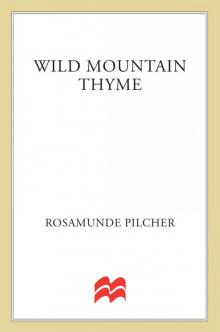 Wild Mountain Thyme
Wild Mountain Thyme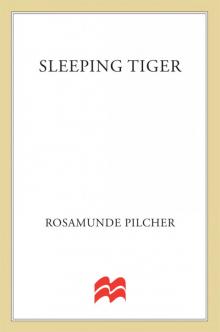 Sleeping Tiger
Sleeping Tiger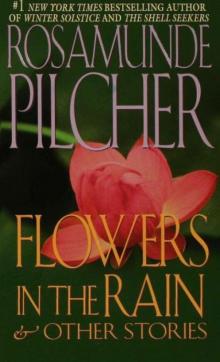 Flowers in the Rain & Other Stories
Flowers in the Rain & Other Stories September
September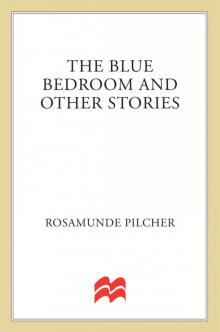 The Blue Bedroom: & Other Stories
The Blue Bedroom: & Other Stories The Carousel
The Carousel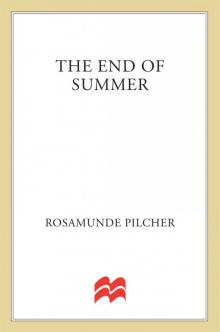 The End of Summer
The End of Summer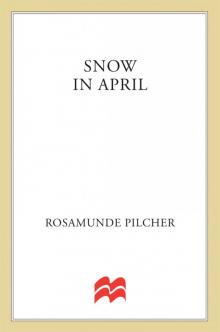 Snow in April
Snow in April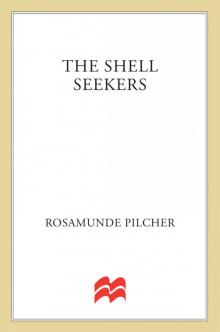 The Shell Seekers
The Shell Seekers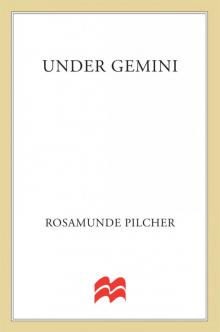 Under Gemini
Under Gemini The Empty House
The Empty House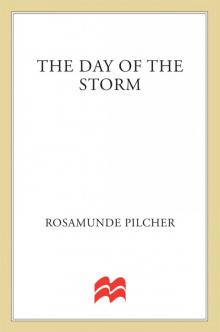 The Day of the Storm
The Day of the Storm Another View
Another View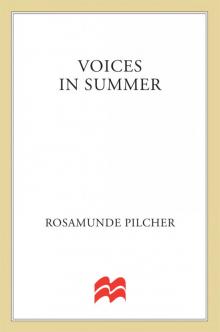 Voices in the Summer
Voices in the Summer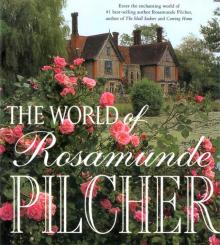 The World of Rosamunde Pilcher
The World of Rosamunde Pilcher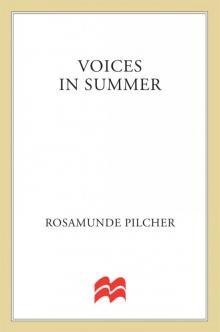 Voices In Summer
Voices In Summer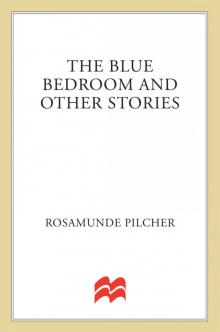 Blue Bedroom and Other Stories
Blue Bedroom and Other Stories